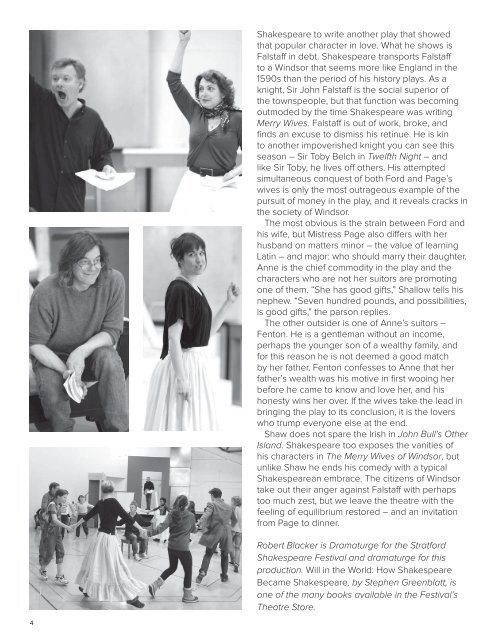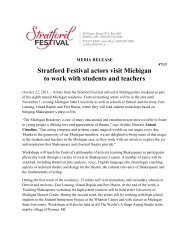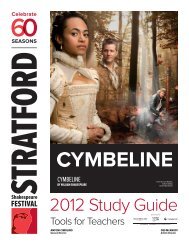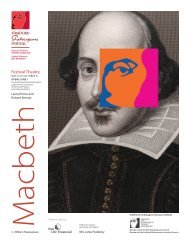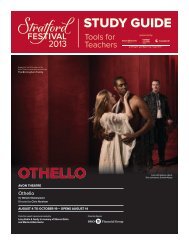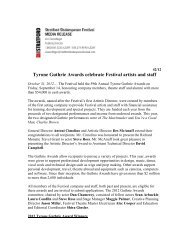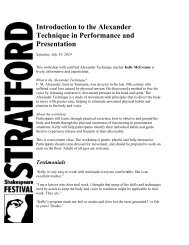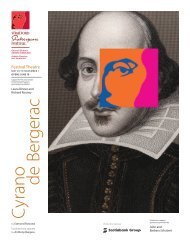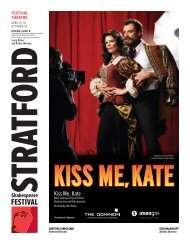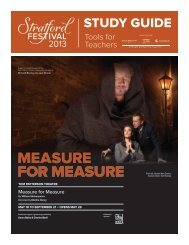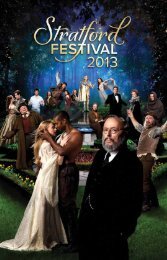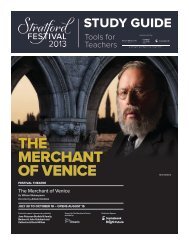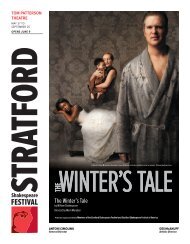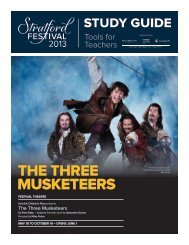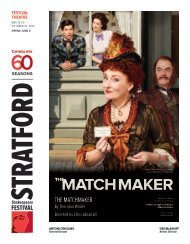The merry wives of windsor - Stratford Festival
The merry wives of windsor - Stratford Festival
The merry wives of windsor - Stratford Festival
Create successful ePaper yourself
Turn your PDF publications into a flip-book with our unique Google optimized e-Paper software.
Shakespeare to write another play that showed<br />
that popular character in love. What he shows is<br />
Falstaff in debt. Shakespeare transports Falstaff<br />
to a Windsor that seems more like England in the<br />
1590s than the period <strong>of</strong> his history plays. As a<br />
knight, Sir John Falstaff is the social superior <strong>of</strong><br />
the townspeople, but that function was becoming<br />
outmoded by the time Shakespeare was writing<br />
Merry Wives. Falstaff is out <strong>of</strong> work, broke, and<br />
finds an excuse to dismiss his retinue. He is kin<br />
to another impoverished knight you can see this<br />
season – Sir Toby Belch in Twelfth Night – and<br />
like Sir Toby, he lives <strong>of</strong>f others. His attempted<br />
simultaneous conquest <strong>of</strong> both Ford and Page’s<br />
<strong>wives</strong> is only the most outrageous example <strong>of</strong> the<br />
pursuit <strong>of</strong> money in the play, and it reveals cracks in<br />
the society <strong>of</strong> Windsor.<br />
<strong>The</strong> most obvious is the strain between Ford and<br />
his wife, but Mistress Page also differs with her<br />
husband on matters minor – the value <strong>of</strong> learning<br />
Latin – and major: who should marry their daughter.<br />
Anne is the chief commodity in the play and the<br />
characters who are not her suitors are promoting<br />
one <strong>of</strong> them. “She has good gifts,” Shallow tells his<br />
nephew. “Seven hundred pounds, and possibilities,<br />
is good gifts,” the parson replies.<br />
<strong>The</strong> other outsider is one <strong>of</strong> Anne’s suitors –<br />
Fenton. He is a gentleman without an income,<br />
perhaps the younger son <strong>of</strong> a wealthy family, and<br />
for this reason he is not deemed a good match<br />
by her father. Fenton confesses to Anne that her<br />
father’s wealth was his motive in first wooing her<br />
before he came to know and love her, and his<br />
honesty wins her over. If the <strong>wives</strong> take the lead in<br />
bringing the play to its conclusion, it is the lovers<br />
who trump everyone else at the end.<br />
Shaw does not spare the Irish in John Bull’s Other<br />
Island. Shakespeare too exposes the vanities <strong>of</strong><br />
his characters in <strong>The</strong> Merry Wives <strong>of</strong> Windsor, but<br />
unlike Shaw he ends his comedy with a typical<br />
Shakespearean embrace. <strong>The</strong> citizens <strong>of</strong> Windsor<br />
take out their anger against Falstaff with perhaps<br />
too much zest, but we leave the theatre with the<br />
feeling <strong>of</strong> equilibrium restored – and an invitation<br />
from Page to dinner.<br />
Robert Blacker is Dramaturge for the <strong>Stratford</strong><br />
Shakespeare <strong>Festival</strong> and dramaturge for this<br />
production. Will in the World: How Shakespeare<br />
Became Shakespeare, by Stephen Greenblatt, is<br />
one <strong>of</strong> the many books available in the <strong>Festival</strong>’s<br />
<strong>The</strong>atre Store.<br />
4


